LATEST NEWS
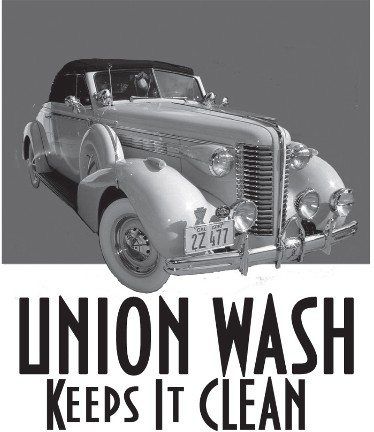

After a year-long campaign by labor and community groups on behalf of carwasheros in what is traditionally a progressive town, the City of Santa Monica will no longer contract with car-wash businesses that are not in compliance with federal and state employment laws.
In addition to strict implementation by the city’s Finance Department of existing policies that require those receiving City dollars to comply with laws, the Santa Monica City Attorney’s office will investigate practices at all four car washes located in Santa Monica as part of its Consumer Affairs operations.
Rather than employ public workers to wash city trucks, police cars and other vehicles, Santa Monica, like many other cities, contracts with local car washes to keep its vehicles clean. After California’s Attorney General reached a settlement with Bonus Car Wash in Santa Monica that resulted in the business agreeing to a contract with the United Steelworkers Union,
» Read more about: Santa Monica: Car Wash Businesses Must Come Clean »


Wednesday, June 13, near the very spot where Walmart hopes to establish a beachhead in central Los Angeles, labor, community and political leaders will put the retail giant on notice that it can forget about getting the red carpet treatment. The company’s plans to open an express store selling groceries in Chinatown have provoked widespread opposition that goes beyond mere irritation over the arrival of a corporate megachain.
As Frying Pan News has documented, Walmart typically has a blighting effect on the communities where it locates: Local stores go out of business and the retailer’s workers, who lack decent wages and medical coverage, must rely on for public assistance in the form of food stamps and emergency room visits.
But it is mostly the dismal working conditions of employees at Walmart and its suppliers that is fueling resistance to the company’s expansion. Only yesterday foreign guest workers employed by a Louisiana seafood supplier to Walmart went on strike against what they say are long,
» Read more about: Largest Anti-Walmart Rally Ever to Be Announced »


The fallout from the failed bid to unseat Wisconsin Governor Scott Walker, along with election victories to curtail public-employee pensions in San Diego and San Jose, continues for organized labor. While a number of media stories have questioned the strategic wisdom of trying to unseat a sitting governor who had not been accused of criminal wrongdoing, many moderate and progressive writers have been thinking aloud about something more fundamental – the very existence of unions.
“These votes,” the Atlantic.com’s Derek Thompson writes, “didn’t announce a new trend. They reminded us of a very old one.” His post’s title asks the disturbing question, “Are Unions Necessary?” It turns out he doesn’t have an answer. After we follow a recap of the long, slow decline of labor over the past half century, and some scary line graphs comparing plummeting union membership numbers with the fall of middle-class incomes, Thompson invites us to offer our opinions.


There’s no pleasing stock traders. No sooner had European financial ministers granted Spain’s banks a $125 billion bailout than investors began worrying about Italy’s ability to pay its national debt – and to pitch in to save Spain. According to The New York Times, “[b]ecause Italy does not have enough economic growth to generate the money itself, the government will probably have to borrow it at high interest rates, adding to an already heavy debt load.” The Times on Monday quoted Italian Prime Minister Mario Monti’s pessimism: “There is a permanent risk of contagion.”
Although the mention of a European economic plague certainly makes ears stand up, the continent’s continual financial woes more resemble a Möbius strip of dominoes. With each new agreement to save one of the Mediterranean PIGS (Portugal, Italy, Greece, Spain), a new panic spreads on the floors of Europe’s stock exchanges.
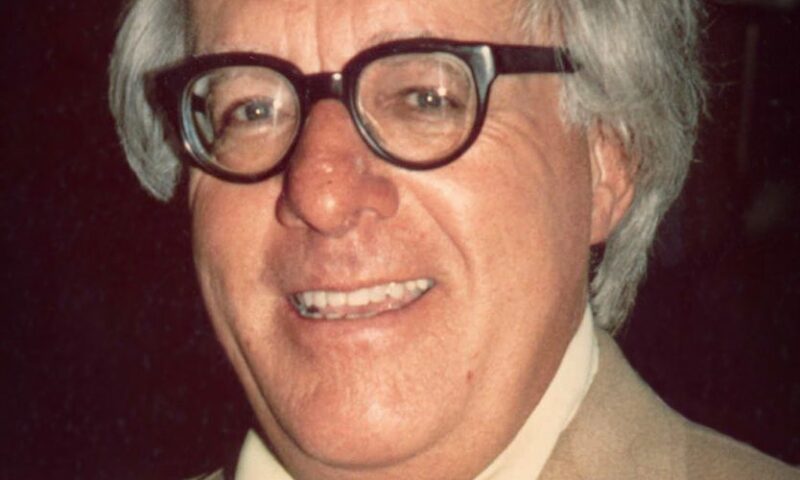

Much was made in Ray Bradbury’s obits last week of his paradoxical nature: He was a science fiction writer who never drove a car or used a computer, a seer who looked to the past to describe the future. All of which was true – Bradbury was one of the few authors who could make a trip to the next century seem like a sentimental journey. The reason is that so much of his Tomorrowland was really mid-20th Century America dressed up in a space suit and relocated to Mars. The Midwestern front porch on a summer evening, lit by fireflies and the murmur of conversation, was as key to Bradbury’s fictional worlds as rocket ships and robots.
In fact, Bradbury is too often typecast as a science fiction writer – after all, he wrote a number of plays for Los Angeles theater, along with the screenplay for John Huston’s film Moby Dick and the narration for King of Kings.


Even as transit agencies around the U.S. are cutting back on bus and rail service and raising fares, L.A. has embarked on this country’s most ambitious transit expansion — from 118 miles and 103 stations to 236 miles and 200 stations, a work program likely to generate an estimated 400,000 construction jobs.
For the first time ever in Southern California there are three lines under construction at the same time: Expo to Santa Monica, the Gold Line to Azusa and the Orange Line to Chatsworth. Add the Crenshaw Line and the downtown L.A. Regional Connector — utilities are being relocated now so construction can begin — and that’s five lines under construction.
Suddenly the world is looking at Los Angeles in a very different light. As Brookings Institution spokesman Adie Tomer told the Los Angeles Times:
“You have this archetype of L.A. as the highway city of America.
» Read more about: Honoring the Champions of Better Transit »


(Editor’s Note: This American Prospect post appeared on the eve of last Tuesday’s Wisconsin recall vote and, as such, only anticipates events that have since occurred. Still, Harold Meyerson offers some astute insights into why that recall effort ultimately failed.)
We don’t know the outcome of Tuesday’s gubernatorial election in Wisconsin, of course, but we do know this: Even if labor somehow manages to oust Republican Governor Scott Walker, the result will be nothing like the resounding repudiation that Ohio voters delivered last year in repealing that state’s anti-collective bargaining law pushed by an equally controversial GOP governor, John Kasich.
Why the difference? Kasich’s bill went beyond Walker’s in banning collective bargaining for cops and fire fighters, which proved a decidedly unpopular position, but that can hardly account for more than a fraction of the difference. Moreover, Wisconsin is generally regarded as a more liberal state than Ohio.


A June 4 Los Angeles Times article reported that hotel rates for business travelers in North America surged 9.3 percent in April, coming within 3 percent of the peak pre-recession rates in fall 2008. Rates for leisure travelers also rose 7.3 percent. The report also indicated that rates will continue to increase as demand continues to rise. This is a big deal because it means travel (both leisure and business) is heading in a positive direction since the 2008 recession hit. A city like Los Angeles – that hosted a record 26.9 million visitors last year – has a great opportunity to capture this rise in tourism. As the number one employer in L.A. County, home to pristine beaches, year-round beautiful weather and other attractions, tourism is poised to be one of the primary sectors that will lead Los Angeles out of the recession.
However, Los Angeles has some major work to do to be a leader in tourism and to develop a sustainable model that equally benefits the industry,
» Read more about: Travel's Up — Will Los Angeles Rise to the Occasion? »


The New Republic’s Richard Yeselson has a perceptive piece on that publication’s website that’s worth reading before our collective amnesia allows us to forget all about Governor Scott Walker’s recent electoral triumph.
“Not With a Bang, But a Whimper: The Long, Slow Death Spiral of America’s Labor Movement” is, as you might surmise, another in a series of post-Wisconsin election eulogies for American unions. Yet it’s much more, becoming a meditation on the place unions once occupied in the American imagination, both in politics and pop culture, and how their mention today barely elicits shrugs – even from many union members.
Yeselon likens unions to the typewriters that many writers of a certain age profess affection for but which none of us will ever return to using. “The problem isn’t that most people hate unions,” he writes. “The problem for unions is that most people don’t care about them,
» Read more about: WebHot: Why Unions Are Typewriters and Not Laptops »
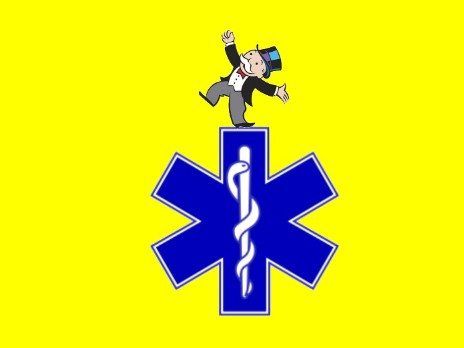

Now that Mitt Romney has clinched his position as the GOP presidential candidate, it’s time more than ever for Romney to avoid talking about the health care reform measure he created as Governor of Massachusetts.
You remember President Obama’s health-care legislation, the Affordable Care Act (ACA), the one that passed through Congress as smoothly as a kidney stone, thanks to shrill conservative opposition? Key parts of that act were lifted straight from Gov. Romney’s measure, but Mitt can’t afford that association, given the Right’s steady vilification of the plan as “socialism.” Which is why Romney has been running around attacking “Obamacare” instead.
Some Republicans are reading the polls and surfacing the idea of legislation to replace the Obama Administration’s ACA.
It seems their idea is to retain the most popular aspects–covering young people until they are 26, close the Medicare “doughnut hole” that requires patients to pay more for their medications and guarantee coverage despite pre-existing conditions.
» Read more about: Bad Medicine: Walmart's Rx for Employee Health Care »
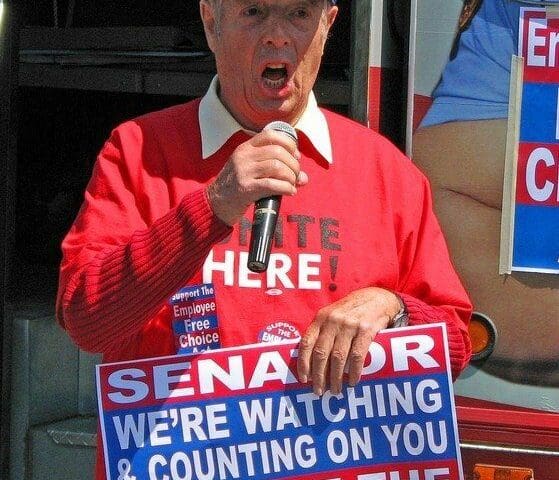

File this under the We Couldn’t Have Said It Better Ourselves Department: Op-ed columnist Joe Nocera articulated on the very respectable pages of the New York Times what many of us have known for years: Unions are good for the economy. Well, no – make that, unions are essential for the economy to work for everyone. Nocera, the famously contrarian business writer, talks about his picket-line-walking parents and his union-solid Rhode Island birthplace – but how, as a member of America’s post-war educated class, he came to view organized labor “with mild disdain.”
The madeleine that stokes his remembrance of union things past is The Great Divergence, Timothy Noah’s new book about income inequality. After confessing to holding an outlook once similar to Noah’s early views of labor as “a spent force,” Nocera now agrees with him that liberals have turned their backs on unions with terrible consequences.


While hardly surprising to anyone who read the polls, yesterday’s victory by Republican Governor Scott Walker was a body blow to Wisconsin unions and to American workers. Within Wisconsin, Walker’s victory ensures that his law repealing collective-bargaining rights for public employees will stay on the books, and if Republicans maintain their hold on the state senate—four of their senators faced recall elections, and as I write this at least three have survived—they will, at least in theory, be able to go forward on other parts of their Social Darwinist agenda. Whether they will—and whether they opt to go after private-sector unions, too, with right-to-work legislation—remains unclear. Such a move on Walker’s part, coming on the heels of the most divisive 18 months in the state’s history, would only escalate what is already a political civil war. Even Walker may think it the better part of valor to pass on that for now.
But the damage already done by Walker’s anti-union legislation,


When I arrived in this country, you conform to what is given. I came by myself. It’s very difficult living here without knowing anyone, not knowing where a store is, not having money to buy water or bread. When you find a job, if they offer you $50, you don’t have to think about it – you need this money, so you take it.
– Jose Juan Romero, restaurant worker
and former food-processing worker
If you’re like me, you probably try to watch what you eat, eat healthy, eat organic when possible, shop at the farmers’ market to support local family farmers… but have you thought about the workers who do the work to provide the food on your plate?
When I first became a vegetarian almost 20 years ago, I didn’t think about the workers. I made an ethical decision to change the way I ate,

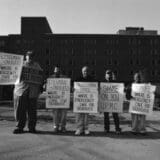
All the bad things you heard about the 2012 Whitney Biennial, which closes June 10, are too true. For some time now the Biennial has been a favorite piñata of conservative critics who’ve bristled at the introduction of Lowbrow art and other populist trends. This 76th biennial, however, annoyed a number of reviewers across the spectrum. Huffed the Village Voice:
Composed of arty ephemera, light musings on decades-old conceptual processes, and bogus curatorial gestures that conflate sculpture with performance and installation with music—the mind boggles at the notion of turning over most of the museum’s fourth floor to genre-mixing “free collage,” i.e., choreographer Sarah Michelson’s noodling at preview time—the 2012 biennial promulgates a dark sensibility as an artistic foil to America’s Tim Tebow culture.
Part of the reason some New Yorkers were riled up was the show’s corporate provenance: It was bankrolled by Sotheby’s and Deutsche Bank,
» Read more about: Closings: The Whitney Biennial's Dark Sparkle »
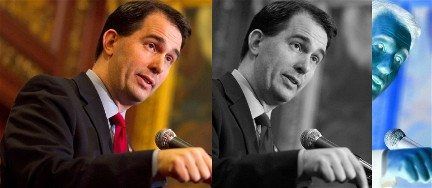

Here’s a headline you won’t see, but should: “Scott Walker Spent 88 percent of the Money to Get 53 Percent of the Vote.”
Political pundits will spend the next few days and weeks analyzing the Wisconsin recall election, examining exit polls, spilling lots of ink over how different demographic groups — income, race, religious, union membership, gender, party affiliation, independents, liberals/conservatives/moderates, etc — voted on Tuesday.
But the real winner in Wisconsin on Tuesday was not Gov. Scott Walker, but Big Money. And the real loser was not Milwaukee Mayor Tom Barrett, but democracy.
Walker’s Republican campaign outspent Barrett’s Democratic campaign by $30.5 million to $4 million — that’s a 7.5 to 1 advantage. Another way of saying this is that of the $34.5 million spent on their campaigns, Walker spend 88 percent of the money.
Walker beat Barrett by 1,316,989 votes to 1,145,190 votes — 53 percent to 46 percent (with 1 percent going to an independent candidate).
» Read more about: Wisconsin: Buying Democracy, One Vote at a Time »


Last week, more than 30 citations were issued by the California Occupational Safety and Health Administration (Cal/OSHA) to a waste recycling company called American Reclamation, Inc., its subsidiaries and a temporary employment agency. The citations dealt with serious violations at a material recovery facility in Los Angeles, which is where trash is sorted by hand to remove recyclables from other waste.
Cal/OSHA cited the company for violations of health and safety standards,
failure to train workers properly and a host of other unlawful practices. I’m happy that our state health and safety enforcers caught these violations, but I fear that the lack of enforcement resources in California means many other violations at other facilities are slipping through the cracks.
Coming off a thrilling victory on banning plastic bags, the City of L.A.’s next waste discussion centers on taming the currently out-of-control open permit system that governs how waste is collected for business and large apartment buildings.
» Read more about: Waste Violations Hurt L.A. Workers and the Environment »
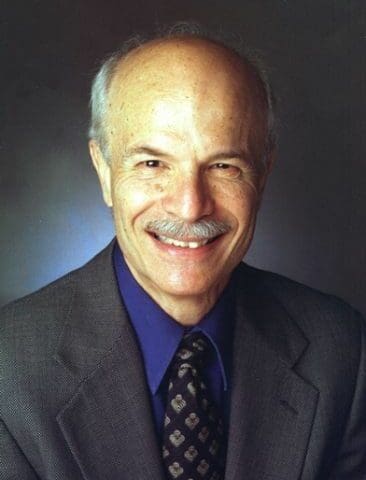
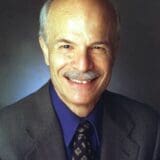
Since his sudden death in April, I’ve been trying to imagine the health care movement without Rick Brown’s wise counsel, coherent advocacy, and perfect research. E. Richard Brown was a professor of Public Health at UCLA whose research and advocacy touched millions of lives. As a health activist and advocate, I worked with Rick to save California’s county hospitals and health centers, and I use his research, especially the California Health Interview Survey (CHIS) to illustrate the health care needs of various populations in California when I write grant proposals for nonprofit organizations. He was always happy to give me advice about how to frame an argument, and he was always willing to meet with policy makers when activists needed an authority to support them.
The memorial service held on May 29 filled UCLA’s Schoenberg Hall. The crowd included the health activists, labor leaders, UCLA faculty colleagues, and politicians who worked with Rick to gain recognition of health care as a basic human right,
» Read more about: E. Richard Brown: Health Advocate Leaves a Legacy of Justice »


The 20th anniversary of the Los Angeles riots has triggered a number of fascinating reports examining the underlying causes of the unrest and the changes (in attitudes and actions) that have taken place in the past two decades.
Scholars at the University of Southern California produced a report called L.A. Rising: The 1992 Civil Unrest, the Arc of Social Justice Organizing, and the Lessons for Today’s Movement Building. Their counterparts at L.A.’s Loyola Marymount University, published 20th Anniversary of the Los Angeles Riots Survey. And my colleagues at the Los Angeles Alliance for a New Economy (on whose board I proudly serve) published a series of reflections by L.A. activists called Rage and Reflection: Meditations on LA’s 1992 Civil Unrest and the Ongoing Transformation of a City.
» Read more about: "Riots" or "Rebellion": What We Learned from 1992 »


“More deeply still, nonviolence is a spiritual challenge of epic proportions. It calls upon the soul’s authentic longing for heroism, for risking one’s life for an infinite stake, for self-transcendence in giving oneself to another.” – Walter Wink
After Reinhold Niebuhr succumbed to Cold War fever, there was no longer a major voice in Christian ethics among Protestants. In seminary, I myself had to read Paul Ramsey, who couldn’t get any closer to examining the ethics of war than resuscitating Just War Theory from the late days of the Roman Empire. Most of us who opposed the Vietnam War were stuck with a rationale that this-war-in-particular was unjust and therefore should be stopped. Since no one could articulate a thorough critique from a non-violent perspective, we were flying by the seats of our intellectual pants.
Little did I know that alongside mainstream Christian ethics, hidden somewhere in the obscure hallways of academia,
» Read more about: Remembering Walter Wink: Ethical Thought behind Non-Violence »


(This post originally appeared in Labor’s Edge, the blog of the California Labor Federation)
Zombies are everywhere these days. They’re on popular TV shows. They’re in the movies. They’re in our nightmares. But what many Californians don’t know is that zombies are a primary reason of our ongoing budget crisis.
Yes, that’s right. We call them Zombie Loopholes, and they’re devouring our state’s budget.
Today, the California Labor Federation launched a new website to highlight the devastating impact that budget-killing corporate tax breaks are having on our state.ZombieLoopholes.com brings a number of wasteful corporate tax breaks that are bleeding our state of billions each year out of the shadows so the public is aware that they’re contributing to deep budget cuts to school funding, services for seniors and public safety.
With the state facing another budget crisis and more cuts to services we value,
» Read more about: Zombie Loopholes Are Eating California’s Budget Alive »